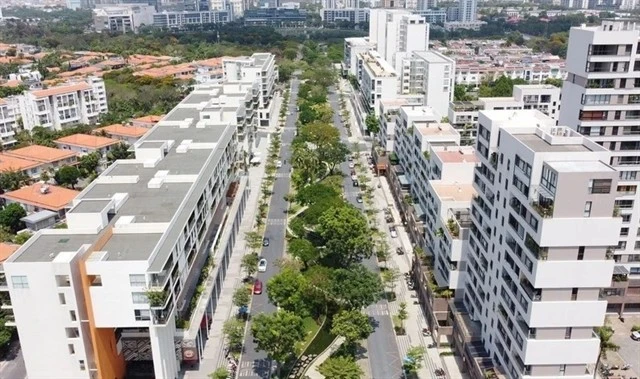Now Reading: VNREA’s Bold Warning: Don’t Abuse Housing Shortage Now
-
01
VNREA’s Bold Warning: Don’t Abuse Housing Shortage Now
VNREA’s Bold Warning: Don’t Abuse Housing Shortage Now

Table of Contents
VNREA urges real estate firms not to exploit supply shortage, highlighting growing concerns over rising property prices and unfair practices amid a fragile market recovery.
The Vietnam National Real Estate Association (VNREA) has issued a firm statement warning real estate companies against taking advantage of the current housing supply shortage. The association emphasized that any such moves could lead to long-term harm to both the market and buyers, especially low- and middle-income families struggling to access affordable housing.
VNREA Raises Alarm Over Market Imbalance
Speaking at a recent press conference, VNREA Chairman Nguyen Van Dinh highlighted the association’s growing concerns over artificial price hikes and speculative practices being seen in certain regions. He stressed that the focus keyword, “VNREA urges real estate firms not to exploit supply shortage,” reflects the core of their current mission: to protect consumer interests and market balance.
“Prices are rising faster than people’s incomes. This is not driven by healthy demand, but by manipulation in some areas where the supply is low,” Dinh said. “We call on all developers to act responsibly and avoid exploiting this sensitive period.”
Current Market Conditions Causing Worry

Vietnam’s property sector has faced a challenging two years. Due to policy tightening, financial difficulties, and delayed projects, the supply of new housing has sharply declined. As a result, there has been a significant imbalance in supply and demand, especially in urban centers like Hanoi and Ho Chi Minh City.
Some property developers have reportedly taken advantage of the low inventory, hiking prices and reducing the number of available units to create the illusion of demand. VNREA warns that this behavior threatens the credibility of the market and could lead to a dangerous real estate bubble.
Five Key Risks If Firms Exploit the Shortage
VNREA outlined five major risks that could arise if firms continue to exploit the supply shortage:
- Artificial Price Inflation – Overpricing can lead to reduced liquidity and create a false sense of demand.
- Loss of Buyer Trust – Consumers will hesitate to enter the market, fearing they are being manipulated.
- Negative Policy Response – The government may enforce stricter regulations to curb speculation.
- Damage to Market Reputation – Vietnam’s real estate sector could lose appeal for foreign investors.
- Widening Social Gap – The affordability crisis will deepen, leaving the middle class and youth behind.
Each of these risks has the potential to severely impact the real estate ecosystem if left unchecked.
Calls for Responsible Development
VNREA is calling for all stakeholders to commit to ethical development practices. They urge developers to focus on real housing needs, especially for affordable and social housing projects.
“Developers must not just chase short-term profits. They must also think about the long-term sustainability of the market,” Dinh noted.
The association further recommended that local governments expedite approvals for new projects and that financial institutions provide targeted credit support for affordable housing developments.
Government to Step Up Oversight
In line with VNREA’s concerns, the Ministry of Construction has confirmed that it will increase monitoring of real estate activities, particularly in regions where supply is tight and prices are rising rapidly.
Nguyen Thanh Ha, a lawyer specializing in real estate law, said: “If VNREA’s warning is ignored, we could see new policy shocks, especially if speculative behavior becomes the norm. It’s important that companies respect market rules and prioritize transparency.”
Transparency and Data Sharing Urged
Another focus of VNREA’s strategy is market transparency. They propose more open data-sharing between real estate firms, regulatory bodies, and buyers. This will help all parties make informed decisions and reduce speculation risks.
The association also wants developers to publicly disclose project timelines, pricing strategies, and inventory levels to ensure fair competition.
Industry Reaction Mixed But Cautious
Several real estate firms have welcomed the VNREA warning and stated that they remain committed to ethical business practices. However, others expressed concern that tighter regulations may limit their ability to adapt to market conditions.
Nguyen Thi Lan, a project director at a major Hanoi-based developer, said: “We understand VNREA’s position and agree that long-term market health is important. But developers also face rising input costs, labor shortages, and long permit approval times. These factors naturally affect supply and pricing.”
She added that more balanced policy reform is needed to tackle root issues like administrative delays and credit access.
What VNREA Wants Moving Forward

VNREA has presented several recommendations to address the housing supply issue without triggering further market volatility:
- Accelerate approvals of projects stuck in legal limbo.
- Prioritize land funds for affordable housing development.
- Offer tax breaks or incentives for projects aimed at low-income buyers.
- Enhance transparency through digital platforms and real-time updates.
- Create stronger penalties for speculative behavior or price manipulation.
These steps, according to VNREA, will help restore balance to the market and ensure that the needs of Vietnamese homebuyers are not sidelined by corporate interests.
Conclusion: A Defining Moment for Vietnam’s Housing Sector
The VNREA urges real estate firms not to exploit supply shortage in a bold and necessary move to keep the market fair and sustainable. With Vietnam’s real estate sector at a crucial juncture, the next few months will test whether developers, regulators, and investors can align toward shared progress—or fall into another cycle of speculation and crisis.
By placing ethical practices above short-term gain, the industry can help shape a real estate future where affordability, transparency, and trust become the new standard.
Also Read – RBI Rate Cut: DLF to Godrej, 4 Stock Winners






















